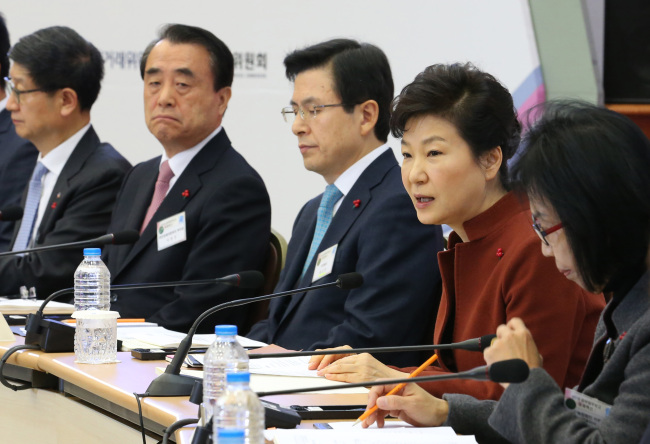Korea’s economic ministries briefed President Park Geun-hye on Thursday on their 2016 economic revitalization policies that will focus on boosting domestic demand and exports in a balanced way.

Just two weeks into 2016, heightening external risks coupled with persistent domestic problems make it seem hardly realistic to achieve the government’s growth target for this year, which is set at 3.1 percent, a modest improvement from last year’s 2.7 percent.
The emphasis on growth through a balance between domestic demand and exports, in the eyes of critics, is nothing but an acknowledgment that policymakers are facing increasing difficulties shoring up growth amid deteriorating external and internal conditions.
Park asked officials to accelerate efforts to enhance economic vitality with a greater sense of urgency. She said the results of such work should translate into concrete benefits for people.
The Ministry of Strategy and Finance said it would front-load nearly 30 percent of annual fiscal spending in the first quarter and encourage public corporations and pension funds to increase investments. More companies will be asked to join nationwide sales promotion events to be held on a regular basis from this year and measures will be taken to lead more households to use reverse mortgages and increase tax benefits for working-class families.
These policy efforts, however, seem to fall short of continuing to bolster domestic consumption, which helped shore up growth amid declining exports last year.
Finance Minister Yoo Il-ho, who took office Wednesday, told lawmakers during his confirmation hearing earlier this week he expected the Korean economy to achieve growth of 3.1 percent without drawing up a supplementary budget. But the new economic team to be led by Yoo, who concurrently serves as deputy prime minister for economic affairs, will find it difficult to turn his expectation into reality, as almost all effective stimulus measures have been used by his predecessor Choi Kyung-hwan.
The Ministry of Trade, Industry and Energy said it would make comprehensive efforts to reverse the declining streak of exports, which fell for 12 consecutive months last year.
Focus will be put on making the most of a free trade agreement with China, put into effect in December, diversifying export items and markets and helping more companies, especially small and medium enterprises, ship their products abroad. The ministry will strengthen support, in particular, for increasing exports of select consumer items ― including cosmetics, food, baby goods and fashion ― and finding more opportunities in some promising markets such as Iran, Vietnam, India and Mexico.
The Ministry of Agriculture, Food and Rural Affairs and the Ministry of Oceans and Fisheries also plan to step up efforts to help increase exports of farm and fisheries products to China by taking advantage of the bilateral trade accord.
Experts note, however, turning around the downward trend in exports will take a drastic restructuring of industries to foster new growth engines and close down uncompetitive companies saddled with overcapacity and mounting debt. They say the government should also pay heed to restricting the rising trade surplus, which results from a steeper decrease in imports, to a proper level to preempt complaints from the country’s trading partners.
The Financial Services Commission said it would be more active in managing household and corporate debts, which are deemed as posing the most serious potential risks for the Korean economy. The agency also plans to push for establishing a mechanism to conduct corporate restructuring on a preemptive and permanent basis through close coordination with creditor banks.
The Fair Trade Commission pledged to strengthen rights for consumers and foster a more favorable business environment for SMEs.
The Ministry of Land, Infrastructure and Transport said it would seek to reduce housing costs for low-income households and promote investments in renovating and expanding infrastructure facilities.
In their year-opening brief to the president, economic policymakers also explained how to push for drastic deregulation, including the establishment of regulation-free zones, to encourage corporate investments.
They also mentioned measures designed to cope with a decrease in the country’s workforce, which is expected to begin from next year.
The briefing was followed by a debate among the participants on specific ways to promote private sector investments through regulatory reforms and cope with downside risks to the economy.
Park will be briefed by other related ministries next week on policies for boosting growth momentum, creating more jobs for young people and providing welfare services tailored to the specific needs of beneficiaries.
By Kim Kyung-ho (khkim@heraldcorp.com)
-
Articles by Korea Herald












![[From the Scene] Monks, Buddhists hail return of remains of Buddhas](http://res.heraldm.com/phpwas/restmb_idxmake.php?idx=644&simg=/content/image/2024/04/19/20240419050617_0.jpg&u=20240419175937)



![[From the Scene] Monks, Buddhists hail return of remains of Buddhas](http://res.heraldm.com/phpwas/restmb_idxmake.php?idx=652&simg=/content/image/2024/04/19/20240419050617_0.jpg&u=20240419175937)

![[KH Explains] Hyundai's full hybrid edge to pay off amid slow transition to pure EVs](http://res.heraldm.com/phpwas/restmb_idxmake.php?idx=652&simg=/content/image/2024/04/18/20240418050645_0.jpg&u=20240419100350)

![[Today’s K-pop] Illit drops debut single remix](http://res.heraldm.com/phpwas/restmb_idxmake.php?idx=642&simg=/content/image/2024/04/19/20240419050612_0.jpg&u=)